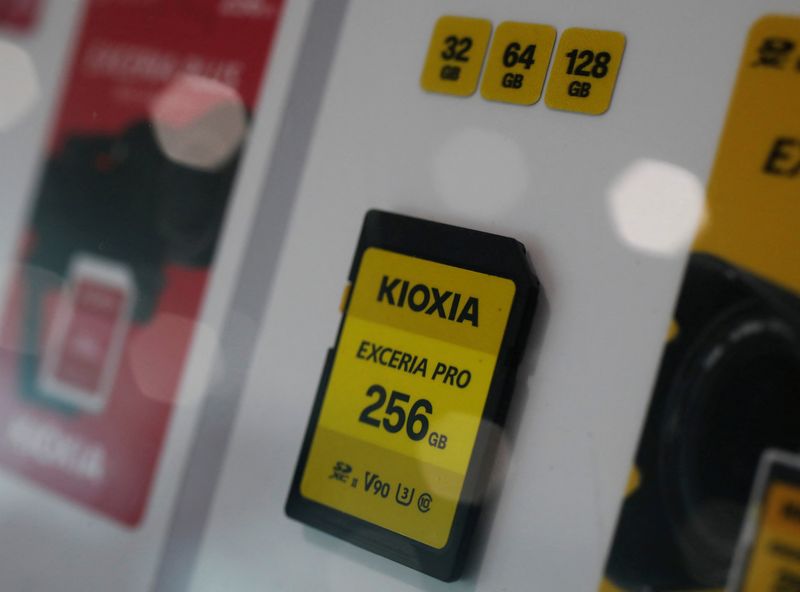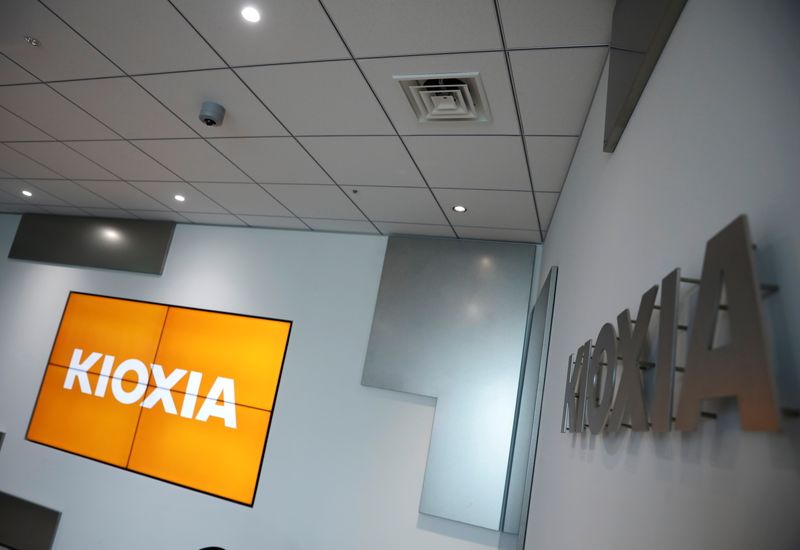By Maki Shiraki and Makiko Yamazaki
TOKYO (Reuters) - Kioxia Holdings Corp and Western Digital Corp (NASDAQ:WDC) are speeding up merger talks and nailing down a deal structure, two sources with direct knowledge of the matter said, as a slumping flash memory market puts fresh consolidation pressure on the world's No. 2 and No. 4 players.
Japan's Kioxia and U.S. chipmaker Western Digital have been hit hard by plunging market demand and oversupply. Combining their flash memory businesses could boost competitiveness against rivals like South Korea's Samsung Electronics (OTC:SSNLF).
Under the plan now being worked out, the merged entity would be 43% owned by Kioxia, 37% by Western Digital and the rest by existing shareholders of the companies, one of the sources said.
Both sources declined to be identified as the talks are private.
No decision has been made and the details could change, the sources said. The planned merger is also likely to draw anti-trust scrutiny in several countries, including the United States and China.
A Kioxia spokesperson declined to comment on speculation. Western Digital did not respond immediately to a request for comment.
Activist investor Elliott Management, which owns convertible preferred shares in Western Digital, has been pushing the U.S. company to split off its flash-memory business from its hard-drive division since making an initial stock investment last year.
Such a split would precede the flash memory combination with Kioxia, one of the sources said, adding that the merged company might pursue a listing after the deal.
Kioxia, previously Toshiba (OTC:TOSYY) Memory, was sold by Toshiba Corp in 2018 to a consortium led by Bain Capital for $18 billion. It has shelved plans for an initial public offering due to the deteriorating flash-memory market. Toshiba still owns 40.6% of Kioxia.
Elliott is also a shareholder of Toshiba, and one of the investor's executives serves on the board of the Japanese company.
Toshiba itself is also undergoing an overhaul. A group led by private equity firm Japan Industrial Partners (JIP) has launched a $15 billion buyout offer for Toshiba, although the company's board has stopped short of recommending the deal to shareholders, citing concerns the price was too low.
Kioxia's falling valuation is one of the factors that dragged down JIP's offer price, according to a Toshiba filing.
It was not immediately clear what Toshiba would do with its stake in Kioxia if the merger with Western Digital's flash memory business proceeded or how the deal would impact JIP's bid for Toshiba, the sources said.
Kioxia and Western Digital were in merger talks in 2021 before the negotiations stalled over a series of issues including valuation discrepancies. Bloomberg reported the revival of the merger talks in January.
In Japan, the two companies jointly produce NAND flash memory chips, which do not need power to retain data and are used in smartphones, personal computers and data centre servers.

A combined Kioxia-Western Digital would control a third of the global NAND flash market, putting it on par with Samsung (KS:005930), the biggest player.
Analysts say Kioxia and Western Digital have been more vulnerable to NAND flash market volatility than Samsung and SK Hynix Inc, which are also main players in the more consolidated DRAM chip market.
